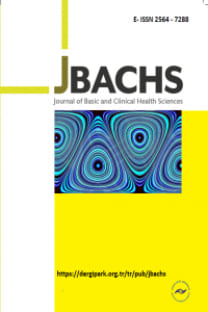The Relationship Between COVID-19 Awareness and Vaccine Hesitancy among University Students
___
- 1. World Health Organization (WHO). Archived: WHO Timeline - COVID-19. https://www.who.int/news/item/27-04-2020-who-timeline---covid-19 (Access date: 08.12. 2021).
- 2. T.C. Sağlık Bakanlığı. COVID-19 Yeni Koronavirüs Hastalığı Güncel Durum 2020. https://covid19bilgi.saglik.gov.tr/tr/ (Erişim tarihi: 08.12.2021).
- 3. Gündüz F. Türkiye’nin Yeni Koronavirüs (Kovid-19) Salgını İle Sınavı: Güvenli Gelecek İnşası Çalışmaları Ve Kamuoyu Algısı. Avrasya Uluslararası Araştırmalar Dergisi 2020; 8(23): 447-467.
- 4. Yüksel GH, Topuzoğlu A. (2019). Aşı Redlerinin Artması ve Aşı Karşıtlığını Etkileyen Faktörler. ESTÜDAM Halk Sağlığı Dergisi 2019; 4(2): 244-258.
- 5. Bilge M. Türkiye’de Covıd-19 Pandemi Sürecinde Dezavantajlı Bireylere Yönelik Uygulamaların İncelenmesi: “Vefa Sosyal Destek Grubu” Örneği (Derleme). Tıbbi Sosyal Hizmet Dergisi 2020; 16: 101-114.
- 6. Şenol D, Taştan A. Covid-19 (Sars-Cov2) Sürecinin 65 Yaş ve Üzeri Kişiler Üzerindeki Etkilerini Anlamaya Yönelik Nitel Bir Çalışma, HABITUS Toplumbilim Dergisi 2021; (2): 1-32.
- 7. Gür E. Vaccine hesitancy-vaccine refusal. Turkish Archives of Pediatrics 2019; 54(1): 1.
- 8. Larson HJ. Blocking information on COVID-19 can fuel the spread of misinformation. Nature Apr 2020; 580(7803): 306.
- 9. Thanh Le T, Andreadakis Z, Kumar A, et al. The COVID19 vaccine development landscape. Nat Rev Drug Discov 2020; 19(5): 305-306.
- 10. Loomba S, de Figueiredo A, Piatek SJ, et al. Measuring the impact of COVID-19 vaccine misinformation on vaccination intent in the UK and USA. Nat Hum Behav 2021; 5: 337–348.
- 11. Shekhar R, Sheikh AB, Upadhyay S, et al. COVID-19 vaccine acceptance among health care workers in the United States. Vaccines 2021; 9(2): 119-134.
- 12. Yüksek Öğretim Kurumu. Öğrenci İstatistikleri 2020. istatistik.yok.gov.tr (Erişim tarihi:27.10.2021).
- 13. Büyükbese T, Dikbaş T. Covid-19 Farkındalık Ölçeği (COVFÖ) Geliştirme Çalışması. Abant Sosyal Bilimler Dergisi 2021; 21(2): 21-40.
- 14. Çapar H, Çınar F. Pandemilerde Aşı Tereddüt Ölçeği: Türkçe Geçerlik Ve Güvenirlik Çalışması. Gevher Nesibe Journal of Medical & Health Sciences 2021; 6(12): 40-45.
- 15. Lucia VC, Kelekar A, Afonso NM. COVID-19 vaccine hesitancy among medical students. Journal of Public Health 2021; 43(3): 445-449. 16. Gülşah U, Kolcu, MİB, Karaca U. COVID-19 Awareness of the Optician Students. Süleyman Demirel Üniversitesi Sağlık Bilimleri Dergisi 2021; 12(3): 261-267.
- 17. Kurtuluş E, Düşünceli B. Covid-19 Fobisi (Korkusu), Covid-19 Farkındalığı ve Genel Aidiyetleri Düzeyleri. Üsküdar Üniversitesi Sosyal Bilimler Dergisi 2021; (13): 451-485.
- 18. Xiao H, Shu W, Li M, et al. Social distancing among medical students during the 2019 coronavirus disease pandemic in China: disease awareness, anxiety disorder, depression, and behavioral activities. Int J Environ. Res. 2020; 17(14): 5047.
- 19. Elgzar WT, Al-Qahtani AM, Elfeki NK, Ibrahim HA. COVID-19 Outbreak: Effect of an Educational Intervention Based on Health Belief Model on Nursing Students' Awareness and Health Beliefs at Najran University, Kingdom of Saudi Arabia. Afr J Reprod Health 2020; 24(2): 78-86.
- 20. Li HZ, Chen HF, Yao ZZ, Zhuang MQ. Investigation on Knowledge Awareness, Self-Protective Behaviors and SAS Anxiety of Nursing Students during the Epidemic of COVID-19. Int J Clin Exp Med 2020; 4(4): 194-200.
- 21. Hasuike M, Hara Y, Mori HM, et al. Influence of new coronavirus pandemic on behavior and awareness of young nurses and nursing students in Japan. BMC Nurs 2021; 20(1): 1-10.
- 22. Labban L, Thallaj N, Labban A. Assessing the level of awareness and knowledge of COVID 19 pandemic among syrians. Arch Med 2020; 12(2): 8.
- 23. Wanberg CR, Csillag B, Douglass RP, Zhou L, Pollard MS. Socioeconomic status and well-being during COVID-19: A resource-based examination. J Appl Psychol 2020; 105(12): 1382-96.
- 24. Gallè F, Veshi A, Sabella EA., et al. Awareness and Behaviors Regarding COVID-19 among Albanian Undergraduates. Behav Sci 2021; 11(4): 45.
- 25. Miettinen R. The concept of experiential learning and John Dewey's theory of reflective thought and action. Int J Lifelong Educ 2010; 54-72.
- 26. Belingheri M, Ausili D, Paladino ME, et al. Attitudes towards COVID-19 vaccine and reasons for adherence or not among nursing students. J Prof Nurs 2021; 37(5): 923-927.
- 27. Çetin AO, Şaşmaz A, Kurtuluş D, et al. Sağlık Öğrencilerinde Aşı Tereddüdü. Anatolian Clinic the Journal of Medical Sciences 2021; 26(3): 239-248.
- 28. Riad A, Pokorná A, Antalová N, et al. Prevalence and drivers of COVID-19 vaccine hesitancy among Czech University students: national cross-sectional study. Vaccines 2021; 9(9): 948-73.
- 29. Yılmaz D, Karaman D, Yılmaz H. İntörn hemşirelik öğrencilerinin Koronavirüs (COVID-19) korkusunun aşı karşıtlığına etkisinin incelenmesi. The Journal of Turkish Family Physician 2021; 12(4): 179-191.
- 30. Salali GD, Uysal MS. Covid-19 vaccine hesitancy is associated with beliefs on the origin of the novel coronavirus in the UK and Turkey. Psychol Med 2020; 19: 1-3.
- 31. Chen Q, Mining L, Yamin L, et al. Mental Health Care for Medical Staff in China during the COVID-19 Outbreak. Lancet Psychiat 2020; 7: 15–16.
- 32. Sallam M, Dababseh D, Eid H, et al. Low covid-19 vaccine acceptance is correlated with conspiracy beliefs among university students in Jordan. Int J Environ. Res 2021; 18(5): 2407.
- 33. Hershan AA. Awareness of COVID-19, Protective Measures and Attitude Towards Vaccination among University of Jeddah Health Field Community: A Questionnaire-Based Study. J Pure Appl Microbiol 2021; 15(2): 604-613.
- Yayın Aralığı: 3
- Başlangıç: 2016
- Yayıncı: DOKUZ EYLÜL ÜNİVERSİTESİ
Eda KILINÇ, Fadime Hatice İNCİ, Asiye KARTAL
Denizhan TÜRKMEN, Çağdaş GÜDÜCÜ, Cem BEDİZ, Erkan GÜNAY
Cihan Caner AKSOY, İsmail SARACOGLU, Lütfiye AKKURT
Adanze Nge CYNTHIA, Bülent KILIÇ
Giray KOLCU, Ayşe COŞKUN BEYAN, Gökmen ÖZCEYLAN
Kezban ÖZÇELİK KAYNAK, Ezgi KARADAĞ
Selin DAVUN, Merve KURNAZ AY, Seyhan HIDIROĞLU, Melda KARAVUŞ
Ayşe Nur YILMAZ, Yeşim AKSOY DERYA
